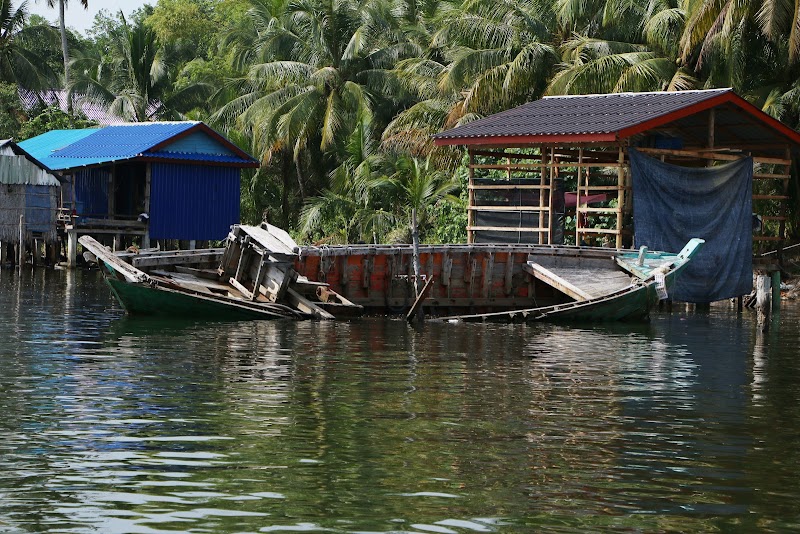
Koh Kong Eco Festival: Adventure and Conservation in Cambodia’s Wild Frontier
The Koh Kong Eco Festival offers a unique blend of adventure and environmental stewardship in Cambodia’s lush southwestern wilds. Experience guided hikes and conservation workshops while exploring vibrant forests and winding rivers, all timed perfectly for those eager to immerse themselves in untamed natural beauty with practical preparation.
Start Early to Avoid Heat
Begin hikes at dawn to take advantage of cooler temperatures and reduce risks of dehydration and heat exhaustion.
Wear Trail-Appropriate Footwear
Choose shoes with good grip suitable for muddy and uneven rainforest terrain to prevent slips and injuries.
Hydrate Consistently
Carry at least 2 liters of water per person and sip regularly to counteract the high humidity and exertion levels.
Respect Wildlife Distance
Maintain respectful distances from animals and avoid disturbing their habitats to ensure your safety and conservation efforts.
Koh Kong Eco Festival: Adventure and Conservation in Cambodia’s Wild Frontier
Each year, the Koh Kong Eco Festival draws adventurers and nature lovers alike to Cambodia’s untamed southwestern coast. Set against dense, green rainforests and rippling rivers that refuse to sit still, this celebration offers a chance to engage directly with the rugged environment while supporting vital conservation efforts. The festival’s centerpiece is a network of hikes and eco-friendly activities designed to challenge bodies and focus minds on the region’s ecological importance.
Trail routes through Koh Kong’s forests range from 5 to 15 kilometers, with elevation gains that sporadically test endurance—expect steady climbs through humid, sometimes slippery terrain under a cathedral of towering dipterocarp trees. The undergrowth hums, alive with insects and darting lizards, while distant calls of hornbills punctuate the thick air. The landscape isn’t merely background; it dares you forward, currents of jungle life pushing ahead as you make your way toward scenic river views and occasional peeks of the Gulf of Thailand.
Festival hikes start early to take advantage of cooler morning air and clearer skies. Proper planning is essential: robust footwear grips the uneven rainforest floor, while hydration packs are non-negotiable to offset humidity-driven sweat. Lightweight, breathable layers help adjust to fluctuating temperatures as the canopy opens and closes along the trail.
Aside from hikes, the event features talks on local wildlife, spotlighting species like the rare Siamese crocodile and endemic fish, whose habitats depend on the health of these waterways. Workshops blend hands-on conservation efforts with eco-tourism insights, inviting visitors to leave a lighter footprint. Practical safety is emphasized—large swaths of forest remain wild and fiercely natural, requiring respect, attention, and straightforward preparedness.
For those considering venturing to Koh Kong during the festival, accommodation options cluster in the nearby city of Koh Kong, balancing comfort and accessibility with eco-conscious values. Travel planners should aim to visit between November and February for the best weather—lower rainfall, manageable humidity, and clear hiking windows—while avoiding the heavy monsoon season, which can turn trails into slick challenges and swollen rivers into untamable forces.
Every step through Koh Kong’s forest invites a direct conversation with a landscape older than most recorded histories, alive and unyielding. The Eco Festival isn't just an event; it's an ongoing engagement with a place fiercely itself, waiting for adventurers willing to listen and tread lightly.
Nearby Trips
All Adventures
Boat Charters
Water Activities
Adventures near Koh Kong, Cambodia
Discover the unique and memorable adventures that make Koh Kong, Cambodia special.
Frequently Asked Questions
What is the best way to get to the Koh Kong Eco Festival?
Most visitors reach Koh Kong city by road from Phnom Penh or Sihanoukville, then take local transport or arranged transfers to festival sites. Roads are generally accessible year-round but check conditions during the rainy season.
Are there guided options available for festival hikes?
Yes, the festival offers organized guided hikes led by experienced locals who know the terrain intimately, helping navigate biodiversity hotspots safely while sharing conservation stories.
What wildlife is commonly seen during the festival hikes?
Expect to see hornbills gliding overhead, monitor lizards sunning on riverbanks, and macaques darting through the canopy. Nighttime walks reveal frogs and slow lorises if you’re lucky.
Is camping allowed during the Koh Kong Eco Festival?
Some designated eco-camp sites are available with prior arrangement, emphasizing low-impact stays that reinforce the festival’s sustainability ethos.
How physically demanding are the trails during the festival?
Trails vary but generally are moderate in difficulty with some steep sections and roots. Suitable for hikers with basic fitness and stamina to handle humid, wet tropical conditions.
What environmental initiatives does the festival support?
Proceeds fund mangrove reforestation, endangered species monitoring, and community education programs aimed at balancing tourism with long-term ecological health.
Recommended Gear
Lightweight Hiking Boots
Offers grip and ankle support necessary for slippery forest floors and uneven trails.
Hydration Pack
Allows hands-free water access and ensures adequate hydration in hot, humid conditions.
Insect Repellent
Protects against mosquitoes and other biting insects prevalent during warmer and wetter months.
Light Rain Jacket
Useful for sudden tropical rain showers and maintaining comfort during wet weather.
Local Insights
Hidden Gems
- "The silent pools near the Tatai River where rare freshwater dolphins occasionally surface"
- "Sunset viewpoints from the high ridge trail with panoramic shots of the Gulf of Thailand"
Wildlife
- "Siamese crocodile (critically endangered)"
- "Gurney's Pitta during migration seasons"
- "Macaca fascicularis troops"
History
"Koh Kong has a history of being a remote trading post and eco-natural frontier. It was less developed compared to Cambodia’s central provinces, preserving much of its forest until recent decades."
